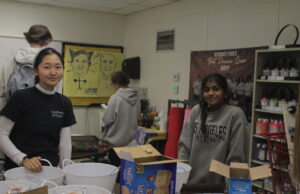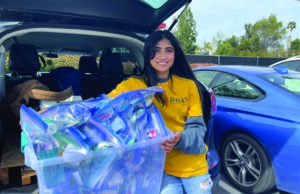Clubs tackle new community service requirement
Preparing for the Southern California Super State competition has been Chess Club’s focus every year. However, this year, along with the rest of the clubs on campus, they will have something else on their agenda: a community service project.
As of this year, all clubs are required to complete a community service project, and 80 percent of its members must participate. Project proposals are due on Dec. 1 to Dean of Activities Carly Adams, with a verification form as evidence of the completed community service due May 1.
According to Adams, the requirement is meant to promote more community involvement.
“We want to get our students out there working with the community,” she said. “We’re also hoping that the clubs have greater meaning, not just meeting because they like a certain interest.”
Some clubs foresee obstacles with the implementation of this project, such as finding a time that works for the majority of members and the logistics involved for off-campus activities.
“We’ve been ignoring it recently and we don’t have many plans yet,” said Jessica Han, junior president of the Speech and Debate club. “We have to have enough people going, and a lot of people may not want to spend extra time outside of school on a day that they may have other plans.”
For service clubs such as Interact Club and Key Club, the requirement has not brought up many problems.
“Our club as a whole hasn’t really been affected by the new requirement, but we really like the requirement because it encourages others to take part in community service,” said Dani Moors, sophomore and secretary of Key Club.
Despite the additional challenges that clubs now face, the requirement has also been received with positivity.
“I think for students, this is actually an opportunity to be outside of school and see things that they’re not used to seeing. It gives them the opportunity to be exposed,” math teacher Miharu Altmire, advisor of several clubs including Speech and Debate, said.
Brandon Chen, junior and president of Chemistry Club, also sees it as a positive addition.
“I think we will get more kids interested in chemistry and (create) a stronger science program,” Chen said. “We make our community a better place not only through direct community service but through spreading knowledge about what we’re doing in high school.”
The service requirement may undergo adjustments in the future.
“We think it’s a great idea… However, it would probably make sense if we had different requirements (for different clubs),” senior Quinn Creger, president of Chess Club, said. “Some clubs such as NHS are targeted towards community service, whereas others such as Robotics and Chess Club have a different focus.”
Responding to this issue, Adams said, “We’re going to see how this year goes, and we might need to make some revisions, maybe make the requirements more specific. We might need to tweak it a little bit.”
In fact, changes are already in order this year. The ASG Constitution lists the service requirement vaguely under Article XVIII, Section 6, reading: “A club must actively contribute to the school by sponsoring activities or services….” Adams said that “the constitution…is not written properly,” and presented to ASG on Oct. 29 in hopes of encouraging amendments to the constitution.
ASG has yet to vote on the changes during the next few weeks’ convention, but Adams looks forward to the implementation of community service for years to come.


